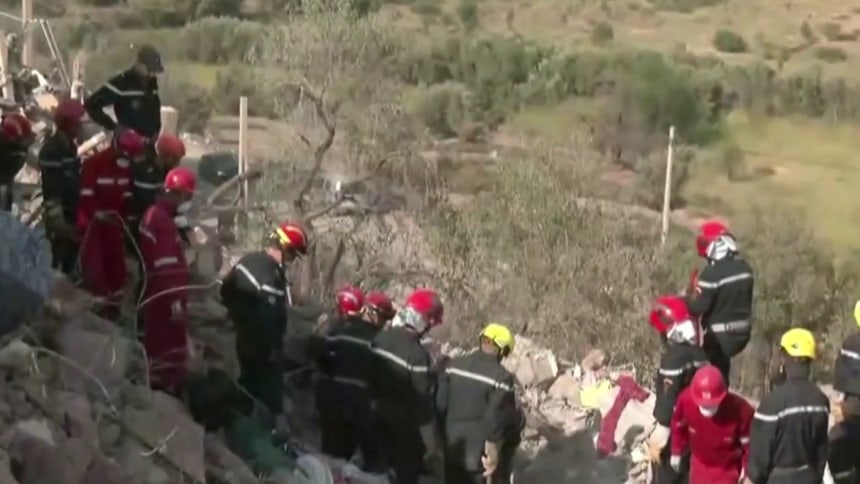High Impact Earthquake Devastation, Morocco
"When all of that collapses, you don't have much chance of surviving, because there are no air pockets [contrasted to areas where buildings are constructed of concrete or other strong materials].""People are generally suffocated by the dust [created when mud brick homes with wood roofs collapse in an earthquake].""Our role is not to find bodies."Arnaud Fraisse, founder, French aid group, Rescuers Without Borders"I was asleep when the earthquake struck. I could not escape because the roof fell on me. I was trapped. I was saved by my neighbours, who cleared the rubble with their bare hands.""Now, I am living with them in their house because mine was completely destroyed."Fatna Bechar, Tafeghaghte, Morocco
 |
| People inspect the damage caused by the earthquake in the village of Tafeghaghte, 62 kilometres south of Marrakech, Morocco, on Monday. (Mosa'ab Elshamy/The Associated Press) |
The
strongest earthquake in the North African country of Morocco in over a
century struck on Friday, leaving over 2,900 people dead and an equal
number injured. Quake-prone areas of the country have homes most often
constructed of mud bricks, stone and clay, with roofs of wood, leaving
the hope of finding any survivors dim. Yet survivors of the quake,
equipped with shovels dug alongside bulldozers on Monday, in remote
Moroccan villages in a desperate bid to rescue those still alive,
trapped in the rubble.
But
as the days pass, hope dwindles that people will be found alive under
their wood-and-dirt homes left pancaked into rubble. Overseas rescue
groups still await permission from Morocco to allow them to travel to
the country to help in the search. A French aid group specializing in
locating victims trapped under debris withdrew its offer to send a
search-and-rescue team after waiting for a green light from Moroccan
authorities that failed to materialize.
To
the present, officials in Morocco have accepted aid offered by
governments in four countries; Spain, Qatar, Britain and the United Arab
Emirates. Officials visualize avoiding a lack of co-ordination,
explains Morocco's Interior Ministry, that "would be counter-productive".
According
to an estimate by the United Nations, 300,000 people were affected by
Friday night's magnitude 6.8 quake, which struck dangerously at a
relatively shallow depth. Most of the deaths and the destruction
occurred in Al Haouz province, located in the High Atlas Mountains,
where houses folded with the quake's impact and steep, winding mountain
roads became clogged with rubble. Local residents attempted to clear
rocks away on their own initiative.
In
the settlement of Tafeghaghte, remote and impoverished, villagers
estimated that over half of the 160 inhabitants were killed. And
although people saw the necessity to work quickly to clear dead bodies, a
foul stench from dead cattle filled the atmosphere in a village which
saw most of its buildings completely disintegrated.
The village, commented Ibrahim Ahdouch who lost two young daughters and two additional family members , resembled a war zone. "There's not shooting, but look around",
he said. Survivors kept a distance from half-ruined buildings
threatening to collapse. People cheered the day before when trucks
carrying soldiers arrived in Amizmiz down the mountainside from
Tafeghaghte, pleading for more help.
"It's a catastrophe.""We don't know what the future is. The aid remains insufficient."Survivor Salah Ancheu, Amizmiz villager
Army
units were deployed along a paved road leading from Amizmiz to more
remote mountain villages, with state news agency MAP reporting
bulldozers and allied equipment are being used to clear routes. In some
villages people wept as boys and helmeted police conveyed the dead
through the streets. Tourists and residents lined up to give blood.
 |
| Rescue workers unearth a body recovered from under the rubble in the aftermath of a deadly earthquake in Talat N'Yaaqoub, in Morocco September 12, 2023. REUTERS/Hannah McKay |
Despite
offers of help pouring in from around the globe, Moroccan authorities
frustrated some overseas rescuers who awaited official approval before
deploying, but that approval was not forthcoming. About 100 teams with
roughly 3,000 rescuers in total registered with the United Nations could
have deployed quickly to the city of Marrakech, also hit by the quake,
according to Fraisse of Rescuers Without Borders.
Moroccan
authorities, he surmised, could be recalling the logistical chaos that
occurred when a 2004 quake killed over 600 people, and aid flights
overwhelmed an airport located in the disaster zone. Morocco is "the master of its choices, which must be respected",
observed French Foreign Minister Catherine Colonna, announcing the
release of $5.4 million in emergency funds for Moroccan and
international non-governmental groups rushing to help survivors.
In
the ancient city of Marrakech, those left homeless, or fearing more
aftershocks have slept out in the streets or under makeshift canopies in
devastated Atlas Mountain towns. Aftershocks have since hit the zone,
upsetting nerves among the locals in areas where damage has left
buildings in entirely unstable conditions.
 |
| Moroccan
villagers race to dig for survivors in the rubble from Friday's
earthquake as the time limit for people to survive shrinks. The
earthquake that struck Morocco has killed at least 2,800 people. CBC |
Labels: Devastated Remote Villages, High Death Rate, High-Impact Earthquake, Morocco, Rescue Missions

<< Home